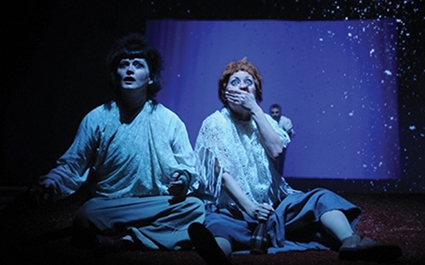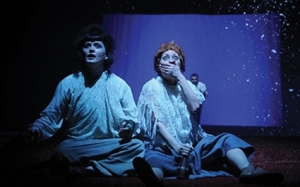Decameron on the Georgian Stage
Decameron is a classic that has seen many stages, but a first in Georgia, at least in my memory.
The plague burns through Florence. Ten youngsters flee to a deserted villa in a village and there begin to tell stories to pass the time. Decameron in Greek means a ten-day event and is attributed to the author’s love of the Greek language. Each of the ten characters is charged as King or Queen of the company for one of the ten days in turn. This charge extends to choosing the theme of the stories for that day. The topics are: examples of the power of fortune; examples of the power of human will; love tales that end tragically; love tales that end happily; clever replies that save the speaker; tricks that women play on men; tricks that people play on each other in general; and examples of virtue. Only Dioneo, who tells the tenth tale each day, has the right to tell a tale on any topic he wishes, due to his wit. Many authors have argued that Dioneo expresses the views of Giovanni Boccaccio himself. Each day also includes a short introduction and conclusion to continue the frame of the tales by describing other daily activities besides story-telling. These interludes frequently include transcriptions of Italian folk songs. The interactions among tales in a day, or across days, as Boccaccio spins “variations and reversals” of previous material, forms a whole and not just a collection of stories. They also retell tensions between different social strata, and depict the perils and adventures of traveling merchants, as well as, at times, mocking the clergy.
The director and author of the staged version is Levan Tsuladze. It is rare to see such decorations in Georgian theatres, as Minimalism is the fashion nowadays. However, if you miss rich sets that take you on an indelible journey, far from grey reality, this is the performance for you. The story itself, though, is not very joyful, even saturated with humor. This is about the plague and sins of the protagonists: in agony, waiting for death every day, and doing things they would not normally do.
The Georgian Decameron begins with a flamboyant moon, which is so mesmerizing that one never wants it to disappear from the stage. The decorations are rich and colorful, creating a natural picture of uneven relief – hills, slopes, etc. However, the culmination is the real triumph – a flood arrives, but the effect is aerial – a violet-bluish ocean covers the stage and then the audience, giving the illusion that there is no border, and life is theater, too, perhaps telling us that books such as Decameron never fade. The flood is terrible, but what a beautiful disaster Tsuladze has chosen! What a beautiful death after multifaceted life, consisting of joy and sorrow, richness and poverty, laughter and tears. The performance is as beautiful and sad as life and as the art of the theater itself. But it is never serious!
The music is another story in itself. Decameron by Levan Tsuladze, assisted by Temo Kuprava and Teona Aptsiauri, has a very vivid audio-visual effect. Thanks to, the blind, or those listening to it on the radio, will equally enjoy the performance. The composer of these marvelous melodies is Vakhtang Kakhidze. The painter of costumes is Nino Surguladze. The choreographer is Gia Marghania, while Shota Skhirtladze is in charge of the battle scenes and fencing.
The cast of actors features: Malkhaz Abuladze, Beso Baratashvili, Eka Nijharadze, Baia Dvalishvili, Manana Kozakova, Keti Tskhakaia, Nino Gachechiladze, Maka Shalikashvili, Marlen Egutia, Zura Berikashvili, Onise Oniani, Zaza Iakashvili, Davit Khurtskhilava and others. All are good, but for us the most outstanding were Baia Dvalishvhili and Keti Tskhakaia.
Lasha Bughadze, renowned modern Georgian writer and dramatist, said of the performance: “Can you imagine the ‘Commedia dell’arte’ played inside the pictures of Boskh, Kranakh or Diurer? such is the Georgian Decameron... [In the end], the water of deluge covers the stage and the whole audience… As if it were Noah’s Ark…”
Decameron lasts for 140 minutes.
WHERE: Marjanishvili Theater
WHEN: Friday (English subtitles)
TICKET: From 6-16 GEL
Maka Lomadze











